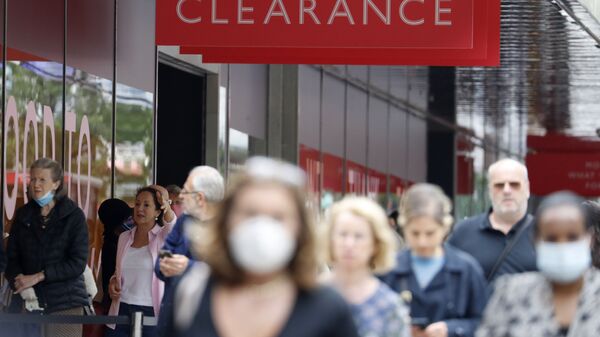The United Kingdom on 6 October saw a new daily high of coronavirus cases, reporting over 14,500 new infections. This is almost 2 thousand more than on 5 October. At the end of September, Prime Minister Boris Johnson said his government doesn’t want to impose lockdown measures to curb the spread of the disease, which, according to the prime minister, is now in its second wave. But reports suggest that the country could face new draconian measures, as Health Secretary Matt Hancock is expected to unveil new details of a three-tiered set of restrictions.
The dramatic surge in infections is not the only problem the United Kingdom is facing in its battle with coronavirus. Brexit, the UK’s withdrawal from the European Union, may cause shortages of drugs and burnout among staff, warned Saffron Cordery, deputy chief executive of NHS Providers.
"All of the issues we feared about Brexit remain. None of those have gone away because we are in a pandemic. I think it is important to remember drug supplies could be compromised, that what we were relying on in Brexit was a supply stockpile. I would suggest we have eaten into that stockpile because of COVID. We need to think about what the stockpiles are looking like", Cordery said.
The Department of Health and Social Care has declined to comment on whether medications stockpiled for Brexit were used up during the first wave of the coronavirus pandemic. Cordery’s statement comes after media reports last week said that there is a global shortage of remdesivir, an antiviral drug which doctors found to be effective for some patients in treating COVID-19.
The NHS will face an even bigger problem if Britain fails to negotiate a post-Brexit agreement with the European Union and leaves the bloc without a deal, Cordery said.
"The no-deal Brexit planning, if you wind back a year or so, it was really about how can we make sure logistics are in place, how can we make sure the whole of the south east doesn’t turn into a lorry park which clogs up arterial routes for ambulances, that means trusts can’t move supplies between sites, and staff can’t move between sites either. We can’t underestimate the fact there will be a squeeze on workforce supply. We rely on high quality European staff", said Cordery.
Whether the NHS is ready to cope with the second wave of the pandemic depends on how far the virus will spread and who it affects, said Dr Matt Cole, a political historian of modern Britain at the University of Birmingham.
"At the moment the number of cases is rising or has been rising quite dramatically on some days and in some weeks. But those being infected in the second way so far - are younger and more resistant to the virus and better able to survive it without support, without hospitalization or all of the health support. If it remains so, then the health service will have a much better chance of being able to deal with the other challenges it has. If that rise in infection continues and reaches the more vulnerable part of the population who were affected by the first wave, those with chronic illnesses, those over 65, then the health service will have a real challenge in terms of space in hospitals, staffing and, of course, drugs”, Cole said.
The government of Boris Johnson has been repeatedly criticized by health experts and the political opposition for what is described as poor handling of the coronavirus outbreak. The recent decision to introduce new measures to curb the spread of the disease, in particular the rule of six, have been criticized both by health experts and politicians.
Cole believes that one of the government’s main problems is that is fails to communicate its coronavirus strategy to the public – "what it expects of them and what will happen if they do not follow those rules". Cole also believes that Johnson is suffering from setting health and social targets that are too optimistic.
"It's been very ambitious in its hopes and it has stated those targets and those hopes publicly. And in a sense, even if its performance is understandably imperfect, having set those high targets, the public is likely to be frustrated and disappointed", Cole said.


